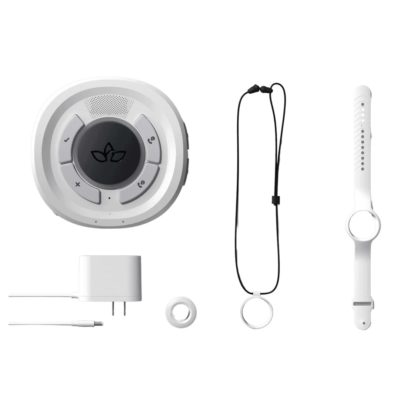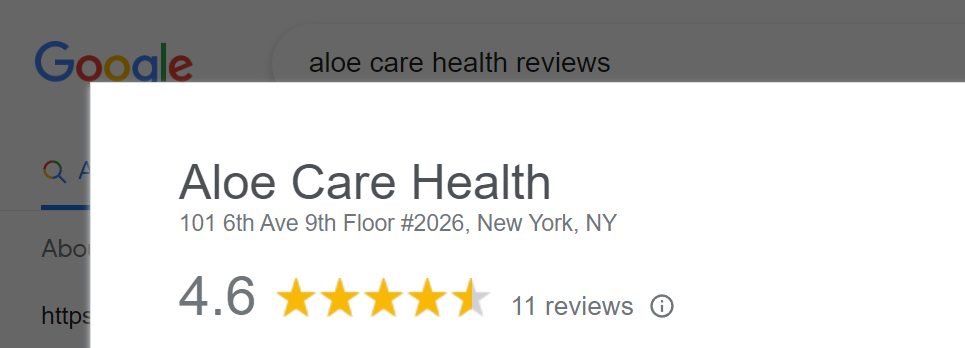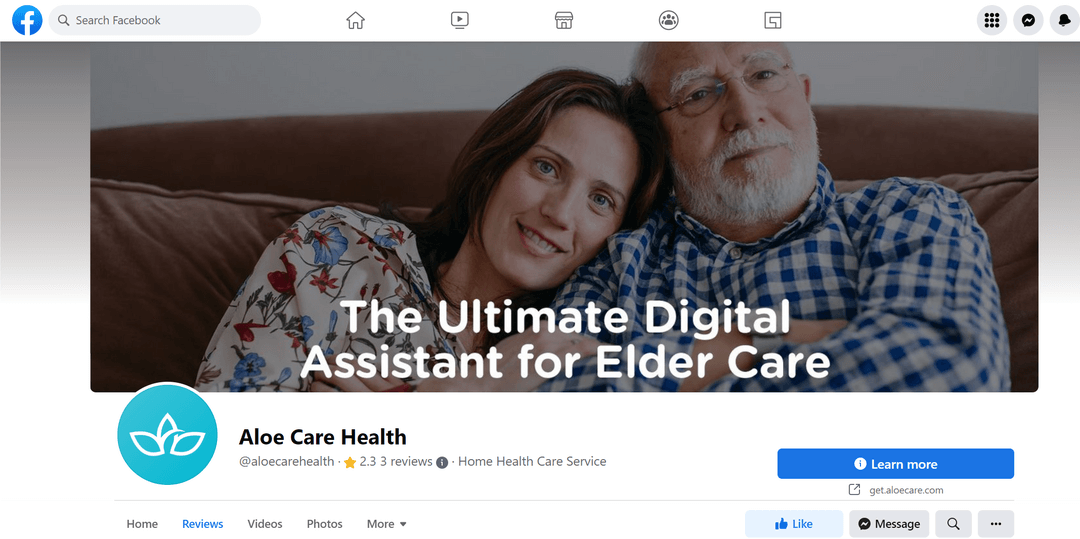Aloe Care Health is one of the newest medical alert systems available. The company debuted in 2020 and offers a truly modern approach to at-home protection. Aloe Care Health’s base station—called the Smart Hub—connects to a 24/7 monitoring center and is voice-activated like Alexa or Google Home. The SmartHub also includes motion sensors and air quality monitors. These are also excellent care features for users with mobility challenges.
This medical alert system is also a great choice for older adults who have multiple family members and friends involved in their care. Caregivers can use the free Aloe Care Health app to talk with their loved ones through the Smart Hub and receive real-time updates about their safety and overall care.
Top features:
- The base station (the Hub) has built in motion, home temperature, and air quality sensors
- The Aloe Care app is included with all subscriptions. Caregivers receive updates during an emergency and call the base station, all by using the app
- Free fall detection is included with the Mobile Companion Go (but fall detection isn’t available with other devices)
Pros and Cons of Aloe Health Care
Pros
-
30-day money-back guarantee
-
The Monitoring Association (TMA) Five Diamond Certified monitoring center
-
Free caregiver app with unlimited users
Cons
-
Only a 200-foot range from the base station
-
You must say “Emergency” several times to get an emergency response from the Smart Hub or fall detection sensor
-
In-home fall detection is only available in one room unless you buy the Mobile Companion Go
-
Expensive equipment fees ($99–$349.99)
How Do Aloe Care Health Medical Alert Systems Work?
Aloe Care Health offers a voice-activated medical alert system with two-way speakers and sensors that detect movement and air quality. We recommend Aloe Care Health for older adults who spend the majority of their time at home or have mobility challenges. You’ll say “Emergency” four to five times in a row to connect to the emergency monitoring center.
During our test, we realized you must be in the same room or only 10 feet from the Hub for voice activation to work. We were able to quickly connect to the monitoring in about 15 seconds.
Aloe Care Health offers a free mobile app that caregivers can use to monitor activity and conditions in your home, including room temperature, air quality, and motion.
Tammy Ennor, quality compliance director of Family Hospice in Belleville, Illinois, said being able to check on loved ones remotely can be a huge benefit for concerned caregivers. “A device should never be a replacement for human interaction,” Ennor said. “But when someone can’t be there, it can offer peace of mind to know a loved one is safe and secure.”
What’s Included in Aloe Care Health Plans
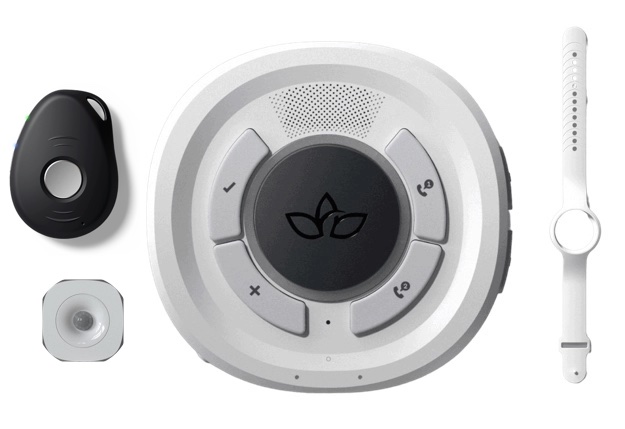
Smart Hub
The Smart Hub is Aloe Care Health’s voice-activated base station powered by AT&T 4G LTE. Connect to the 24/7 emergency response center using your voice or by pushing the Hub’s help button. You must be within 10 feet of the hub to use voice activation. You can even enjoy hands-free calls with family and friends from the Hub.
The Smart Hub has five buttons with the following capabilities:
- A large center button to connect to the monitoring center. It also acts as a motion-sensor night light
- A button to request a check-in from a primary caregiver
- A button to request a check-in from anyone in your caregiver network
- A button to answer “no” to any questions from emergency personnel or caregiver
- A button to answer “yes” to any question from emergency personnel or caregivers
Unlike most standard base stations, the Smart Hub also monitors the following:
- Carbon dioxide (CO2) and volatile organic compounds (VOC) levels
- Home temperature
- Movement patterns or inactivity
- Power outages
The Hub will alert emergency personnel and/or your designated caregivers through the Aloe Care Health app if it detects dangerous air quality, unusual movement patterns, or a power outage.
Care Button
The Care Button is a wearable, water-resistant help button that’s paired with the Smart Hub. We like that a traditional help button is still included in every Aloe Care Health subscription, but a drawback is the protection range. You must be within 200 feet of the base station to connect to the monitoring center with the Care Button. Other companies like Bay Alarm Medical and Medical Guardian offer 1,000–1,400 feet of protection from the base station. More active older adults may consider Aloe Care Health’s Mobile Companion Go to increase their protection inside and outside their homes.
The Care Button doesn’t include a two-way speaker, so you won’t be able to communicate with the monitoring center directly from the button.
Smart Fall Sensor
Aloe Care Health offers an in-home, wall-mounted Smart Fall Sensor for your bathroom with the Total Care plan. The sensor creates a 3D image of the surrounding area and uses radio waves to detect if you’re on the floor and have stopped moving. The sensor will ask you to stand up if it thinks you’ve fallen and will notify the emergency monitoring center if you aren’t able to stand within two minutes.
Aloe Care Health’s Smart Fall Sensor helps keep you protected in one of the most high-risk rooms in your home without having to wear a pendant.
Mobile Companion Go
The Mobile Companion Go (previously the Mobile Companion) is an on-the-go wearable device with automatic fall detection. It’s powered by AT&T cellular service, so you’re connected to the monitoring center both in and outside your home. It has multi-sensory notifications such as lights, sound, and vibrations, to make sure you receive messages. We like this option for active older adults or if someone needs constant, wearable fall protection.
The Mobile Companion Go has a two-way speaker and GPS tracking. It’s slightly bulkier than other mobile medical alert systems we’ve reviewed, but it should easily slip around your neck. Automatic fall detection is included with the Mobile Companion Go at no additional monthly cost. Most medical alert brands charge an additional $5–$10 per month for fall detection. We like that fall detection is free with the Mobile Companion Go since the cost of medical alert systems can quickly add up.
The mobile system is included in the Essentials Plus and Total Care subscriptions or can be purchased separately.
Aloe Care Health App
Caregivers can monitor power outages, home air quality, temperature, and movement through the Aloe Care Health app. We like that there’s no limit to the number of family members, friends, and even neighbors that can join your caregiver circle within the app. Aloe Care Health recommends adding at least five people to get the most out of the app.
The Aloe Care Health app is an excellent tool for coordinating care. It also allows caregivers to:
- Receive a notification if their loved one contacts the monitoring center
- Monitor motion detectors and get fall detection alerts
- Check that the Smart Hub is connected properly
- Share updates with other caregivers
- Pay your monthly bill
Customer Support
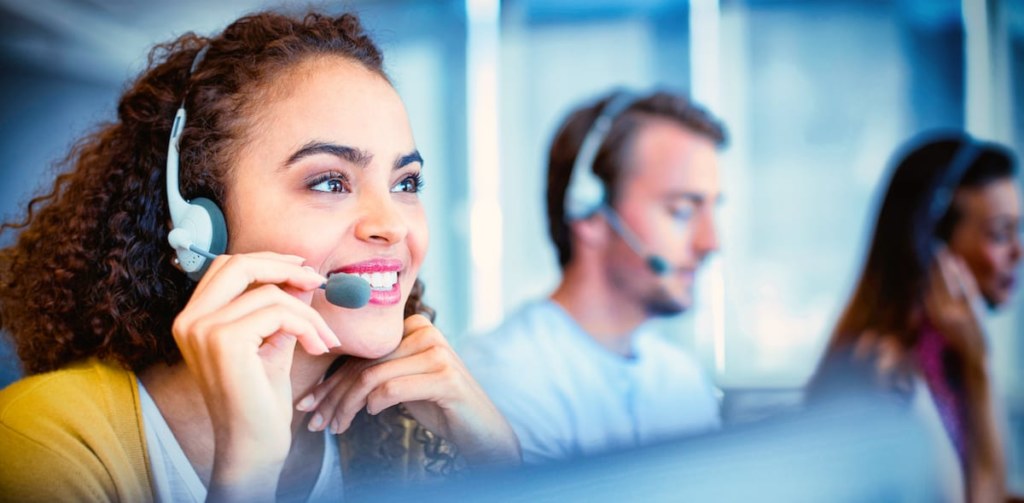
Aloe Care Health has a live chatbot on its site for general support issues. We didn’t have to fill out our name and email address before asking a question in the chat, unlike other medical alert companies we’ve researched. The chatbot suggests support articles to help answer your question.
If your question can’t be answered with a support article or you’d rather speak directly with the support team, you’ll select “Get in touch” in the chat. We like that you’re given three options:
- Request a callback
- Live chat
- Leave a message

We tried out the live chat option and were matched with a customer support representative in under two minutes.
Aloe Care Health Systems
Aloe Care Health offers three separate packages and a mobile device. Review each one carefully when deciding which is right for you.
